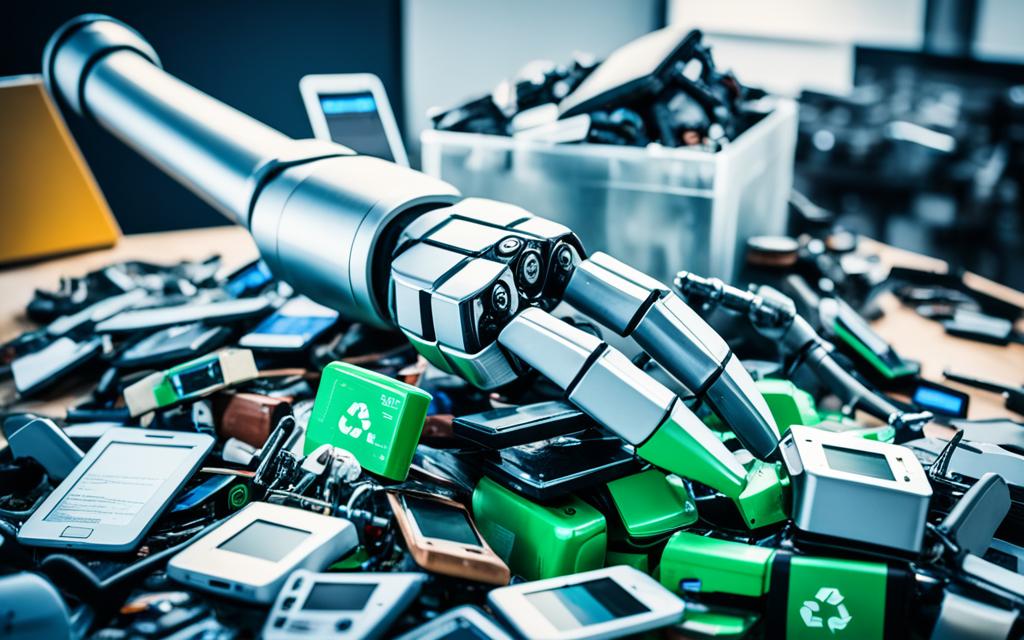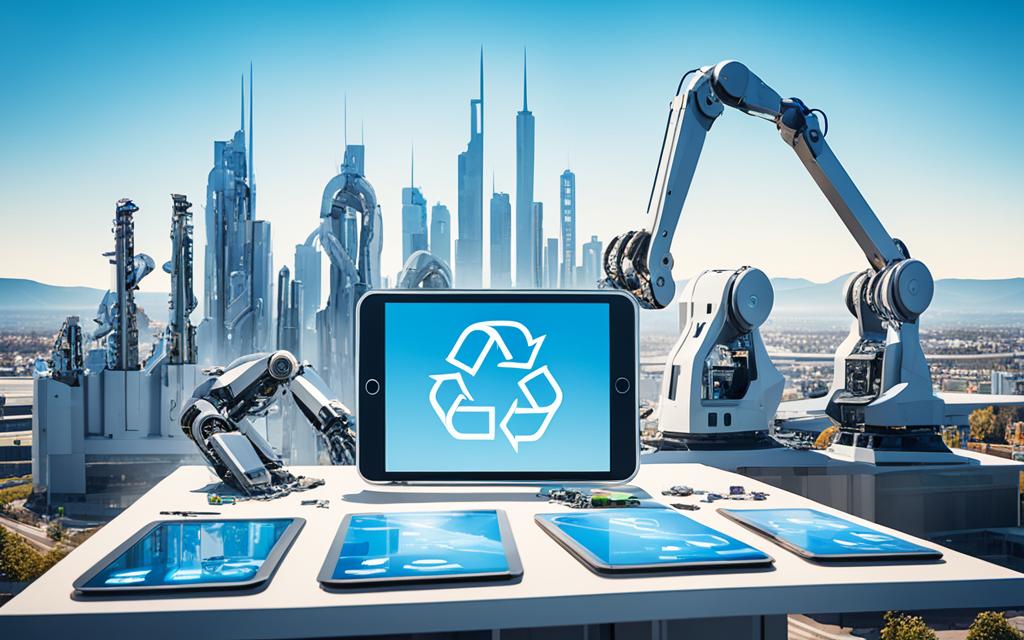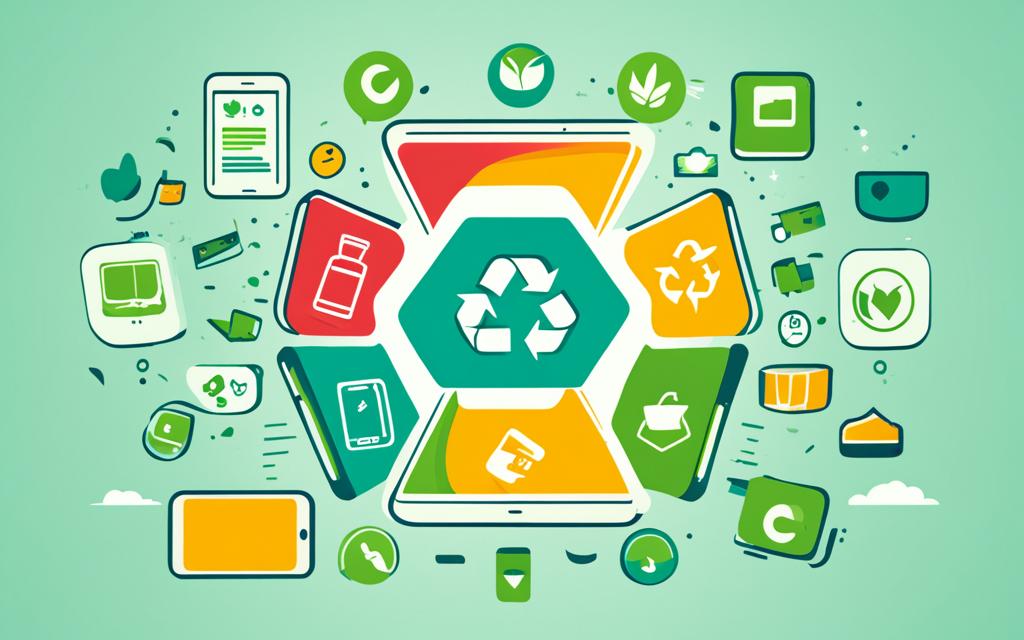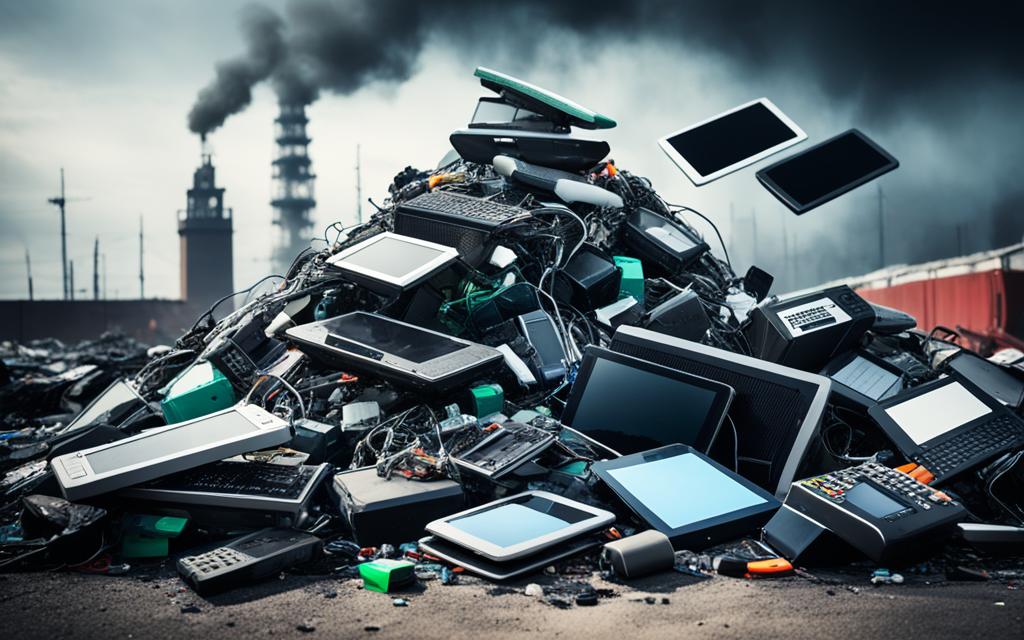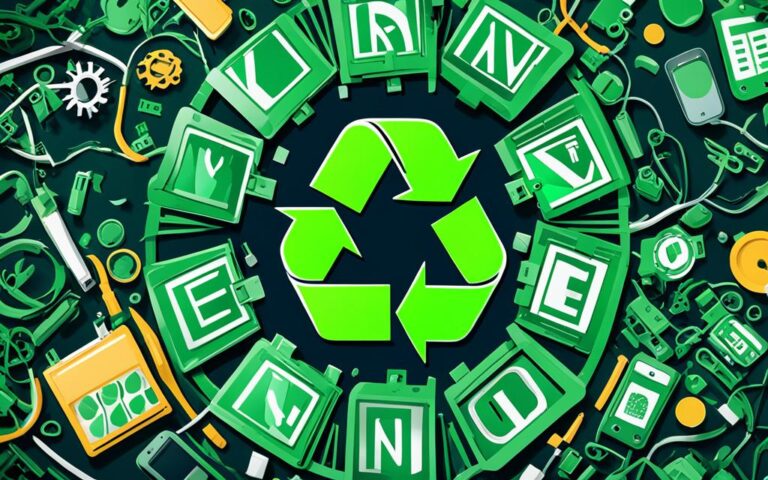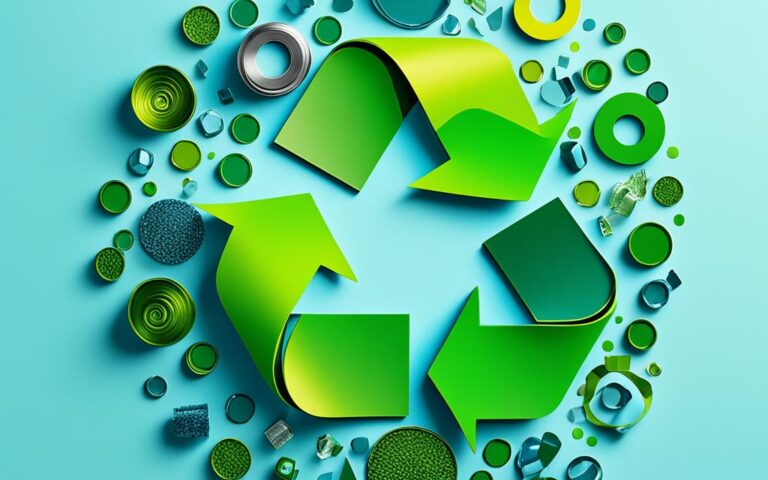The Role of Artificial Intelligence in Optimizing Phone and Tablet Recycling
As we strive towards a sustainable future, waste reduction and resource recovery are becoming increasingly important. One area where artificial intelligence (AI) is playing a crucial role is in the optimisation of phone and tablet recycling. AI technologies are being integrated into waste management systems, revolutionising how we collect, sort, and recycle electronic devices.
By harnessing the power of AI, we can automate waste collection, sorting, and recycling processes, leading to improved resource recovery and a reduced environmental impact. These advancements not only make recycling more efficient but also pave the way for a greener future.
Imagine a world where smart waste bins equipped with AI capabilities can automatically identify and sort recyclables, eliminating the need for manual labour. These bins compress waste and monitor fill capacity, saving effort and reducing the reliance on human intervention.
E-waste kiosks provide a convenient and incentivised means of disposing of electronic devices like phones and tablets. With the help of AI, these kiosks ensure proper recycling of electronic waste, promoting a circular economy and even rewarding users with cash.
AI-powered robots are enhancing recycling processes in recycling centres, where lack of human labour can be a challenge. These robots can sort materials to be recycled, increasing recycling rates and maximising the volume of post-consumer recycled material.
Furthermore, AI waste sorting technology is improving waste categorisation, making the recycling process more cost-effective and efficient. With the use of video capture and AI algorithms, waste materials can be quickly identified and categorised for reuse and recovery.
By embracing AI, we can unlock the full potential of phone and tablet recycling, enabling us to meet the demands of a rapidly increasing waste generation. Together, these AI-powered innovations pave the way for a more sustainable future, where waste is reduced, resources are recovered, and our planet is protected.
Smart Waste Bins: Automating Waste Sorting and Recycling
Smart waste bins equipped with AI-based object identification technology have revolutionized the way waste sorting and recycling are carried out. These innovative bins, such as the ones developed by Bin-e, a renowned company in Poland, utilize artificial intelligence to identify and separate recyclables into dedicated sections. Through this cutting-edge technology, traditional manual sorting is eliminated, and the compression of waste becomes more efficient, ensuring optimal use of bin-fill capacity. By automating the waste sorting process, smart waste bins significantly reduce the need for manual labor, saving valuable time and effort in recycling endeavors.
“The integration of AI and smart waste bins has transformed waste management, propelling us towards a more sustainable future.”
The AI technology integrated into these smart waste bins employs advanced object identification algorithms, allowing them to accurately differentiate between different types of waste materials. This AI-powered identification system ensures that recyclables, such as plastic, glass, paper, and metal, are segregated accordingly, facilitating the recycling process and minimizing contamination. Moreover, these smart waste bins can be linked to centralized waste management systems, offering real-time monitoring of waste levels and optimizing waste collection routes.
Advantages of Smart Waste Bins
Introducing smart waste bins into waste management systems provides numerous benefits:
- Efficient waste sorting: AI-based object identification enables precise segregation of recyclables, streamlining the waste sorting process.
- Improved recycling rates: By eliminating contamination and improving the quality of sorted materials, smart waste bins enhance recycling rates and the production of high-quality recycled products.
- Reduced environmental impact: Proper waste sorting and recycling contribute to a significant reduction in environmental pollution and the conservation of natural resources.
- Enhanced sustainability: Smart waste bins support sustainable practices by optimizing resource recovery and promoting a circular economy.
- Cost-effectiveness: By automating waste sorting, smart waste bins reduce the need for manual labor, resulting in cost savings for waste management operations.
Through the integration of AI-based object identification technology, smart waste bins have become invaluable tools in waste management efforts worldwide. These innovative bins automate the waste sorting process, enhance recycling rates, and contribute to a more sustainable future. By leveraging the power of artificial intelligence, smart waste bins revolutionize waste management practices, paving the way for a greener and more environmentally conscious society.
| Advantages of Smart Waste Bins | Description |
|---|---|
| Efficient waste sorting | AI-based object identification enables precise segregation of recyclables, streamlining the waste sorting process. |
| Improved recycling rates | By eliminating contamination and improving the quality of sorted materials, smart waste bins enhance recycling rates and the production of high-quality recycled products. |
| Reduced environmental impact | Proper waste sorting and recycling contribute to a significant reduction in environmental pollution and the conservation of natural resources. |
| Enhanced sustainability | Smart waste bins support sustainable practices by optimizing resource recovery and promoting a circular economy. |
| Cost-effectiveness | By automating waste sorting, smart waste bins reduce the need for manual labor, resulting in cost savings for waste management operations. |
E-Waste Kiosks: Convenient Disposal and Cash Rewards
E-waste kiosks have revolutionized the way we dispose of electronic waste. As part of a sustainable approach to electronics recycling, these kiosks provide a convenient and incentivized method for individuals to responsibly discard their old devices. One notable brand in this space is ecoATM, which has created a network of e-waste recycling kiosks.
Through these e-waste kiosks, users can easily exchange their unwanted electronics, including tablets and phones, for cash rewards on the spot. This not only encourages proper recycling practices but also offers a financial incentive for individuals to participate in the electronics recycling process.
“With e-waste kiosks, individuals have the opportunity to contribute to a greener future while also receiving immediate cash rewards for their old electronic devices.”
The user-friendly interface of e-waste kiosks simplifies the entire disposal process. Users are guided through the steps of identifying their devices, which are then evaluated for their condition and value. Once the assessment is complete, users are offered a cash reward based on the device’s market value.
Benefits of E-Waste Kiosks:
- Convenient and accessible disposal points in various locations
- Incentivized recycling through cash rewards
- Efficient and user-friendly interface
- Promotes responsible disposal of electronic devices
- Reduces electronic waste in landfills
By integrating e-waste kiosks into the electronics recycling ecosystem, we can effectively divert electronic waste from landfills and encourage a more sustainable approach to handling our old devices. The combination of convenience, cash rewards, and responsible recycling practices makes e-waste kiosks a valuable asset in the pursuit of a greener future.
AI Recycling Robots: Enhancing Recycling Processes
In the quest for sustainable waste management, AI-powered recycling robots are revolutionizing recycling processes in recycling centers. These advanced robots, such as those developed by Denver-based startup AMP Robotics, are designed to efficiently sort materials for recycling, aiding in the achievement of higher recycling rates and the maximization of post-consumer recycled material volume.
Utilizing cutting-edge AI technology and automation, these recycling robots play a crucial role in meeting the ever-increasing demands of recycling. They enhance the efficiency and effectiveness of the recycling process, particularly in cases where there is a shortage of human labor, such as during the COVID-19 pandemic. By seamlessly integrating artificial intelligence into recycling centers, AI recycling robots contribute to a more sustainable future.
“The integration of AI-powered recycling robots has completely transformed our recycling operations. These robots work tirelessly, sorting various materials with incredible accuracy and speed. They have significantly increased our recycling rates and allowed us to maximize the utilization of post-consumer recycled material.” – Recycling Center Manager, XYZ Recycling
The Impact of AI Recycling Robots
The adoption of AI recycling robots in recycling centers has brought about significant positive impacts. Here are some key benefits:
- Improved Sorting Accuracy: AI recycling robots utilize advanced machine learning algorithms to accurately identify and sort different types of recyclable materials. They can classify items such as plastic, glass, metal, and paper with remarkable precision, ensuring optimal resource recovery.
- Increased Efficiency: By automating the recycling process, AI robots expedite the sorting and categorization of recyclables. They work tirelessly, day and night, without fatigue, resulting in faster processing times and increased productivity.
- Enhanced Safety: Recycling centers can be hazardous environments due to the presence of sharp objects and potentially harmful materials. The use of AI recycling robots minimizes the risk of injuries to human workers, ensuring a safer working environment.
With their ability to handle large volumes of recyclables efficiently, AI recycling robots are helping recycling centers achieve their sustainability goals while reducing their environmental footprint.
| Benefits of AI Recycling Robots | Impact |
|---|---|
| Improved Sorting Accuracy | Optimal resource recovery |
| Increased Efficiency | Faster processing times |
| Enhanced Safety | Reduced risk of injuries |
With the continued advancement of AI technology, the capabilities of recycling robots will only expand, enabling them to handle even more complex sorting tasks and contribute to a more circular economy. As the world seeks sustainable solutions for waste management, AI recycling robots provide a promising pathway towards a greener and more environmentally conscious future.
AI Waste Sorting: Improving Waste Categorization
AI waste sorting technology plays a pivotal role in transforming waste management systems by enhancing waste categorization and expediting the recycling process. Manual waste sorting is not only costly but also time-consuming and inefficient. That’s why innovative companies like HERA, a leading multi-utility in Italy, have embraced AI-based solutions to automate trash identification for reuse and recovery.
HERA deploys AI by capturing videos of incoming waste materials, allowing the technology to swiftly identify and categorize the waste, thus streamlining the process and making it both cost-effective and efficient. By minimizing human intervention in waste categorization, AI waste sorting technology accelerates recycling efforts, leading us closer to a sustainable future.
In addition to HERA, companies such as ZenRobotics in Helsinki have developed advanced waste-sorting robots capable of handling both heavy and lightweight materials. These robots increase the volume of sorted waste while substantially improving cost-effectiveness and time-efficiency in waste sorting. Through AI-powered automation, waste management systems can achieve unprecedented levels of accuracy and productivity, making significant strides towards a greener world.
| Benefits of AI Waste Sorting | |
|---|---|
| 1. | Efficient and accurate waste categorization |
| 2. | Reduced manual labor and associated costs |
| 3. | Increased recycling rates and resource recovery |
| 4. | Enhanced cost-effectiveness and time-efficiency in waste sorting |
| 5. | Improved sustainability and environmental impact |
Through AI waste sorting technology, waste management systems can achieve greater accuracy, efficiency, and sustainability in the recycling process. These advancements not only contribute to waste reduction but also foster resource conservation and a more sustainable future.
Conclusion
The integration of AI technologies and mobile apps in waste management has the potential to revolutionize and optimize phone and tablet recycling processes. By automating waste collection, sorting, and recycling, AI-powered systems improve resource recovery, reduce environmental pollution, and create new employment opportunities. These waste management technologies pave the way for sustainable practices and a greener future.
Smart waste bins equipped with AI-based object identification technology streamline waste sorting and recycling. Companies like Bin-e have developed smart waste bins that automatically identify and separate recyclables from non-recyclables, saving manual labor and increasing the efficiency of recycling operations. E-waste kiosks, such as ecoATM, provide convenient and incentivized disposal methods for electronic devices, leading to proper recycling and resource recovery.
AI recycling robots, like the ones developed by AMP Robotics, streamline recycling processes in recycling centers and maximize the volume of post-consumer recycled material. These robots are particularly valuable in situations where human labor is scarce, such as during the COVID-19 pandemic. AI waste sorting systems, such as those implemented by HERA and ZenRobotics, improve waste categorization and accelerate the recycling process, reducing costs and increasing efficiency.
As global waste generation continues to rise, the adoption of waste management technologies becomes increasingly essential. These technologies not only address the challenges posed by the growing waste stream but also contribute to a more sustainable future. By leveraging AI and automation in waste management processes, we can achieve greater resource recovery, minimize environmental impact, and pave the way for a circular economy. The future of recycling lies in the integration of these technologies, and embracing them will bring us closer to achieving sustainable practices and a greener planet for generations to come.
FAQ
How can AI technologies optimize phone and tablet recycling?
AI technologies can optimize phone and tablet recycling by automating waste collection, sorting, and recycling processes, leading to improved resource recovery and reduced environmental impact.
What are smart waste bins and how do they automate waste sorting and recycling?
Smart waste bins are equipped with AI-based object identification technology that allows them to identify and sort recyclables into separate sections. This automation eliminates the need for manual sorting and enables the compression of waste and monitoring of bin-fill capacity.
What are e-waste kiosks and how do they promote proper disposal of electronic waste?
E-waste kiosks are locations where people can exchange their electronic devices, such as tablets and phones, for cash on the spot. These kiosks incentivize proper recycling of electronic devices and ensure their proper disposal.
How do AI recycling robots enhance recycling processes?
AI recycling robots are used in recycling centers to sort materials to be recycled. These robots assist in achieving higher recycling rates and maximizing the volume of post-consumer recycled material, particularly in cases where there is a shortage of human labor.
How does AI waste sorting technology improve the categorization of waste materials?
AI waste sorting technology uses AI-based solutions to automate trash identification for reuse and recovery. By capturing video of incoming waste materials, this technology identifies and categorizes waste, making the process more cost-effective and efficient.

